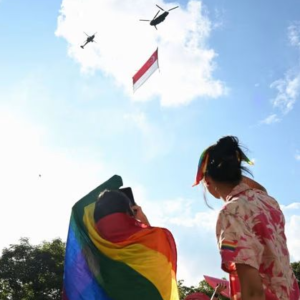Understanding the implications of decriminalizing same-sex relations in Singapore.
It took some time, but we finally got here. “The government will repeal Section 377A and decriminalise sex between men,” announced Prime Minister Lee Hsien Loong during his televised National Day Rally 2022 speech. “I believe this is the right thing to do and something that Singaporeans will accept.”
What exactly is Section 377A?
Section 377A was introduced to Singapore’s penal code in 1938, stating: “Any male person who, in public or private, commits, or abets the commission of, or procures or attempts to procure the commission by any male person of, any act of gross indecency with another male person.” In essence, 377A criminalizes consensual sexual acts between adult males. While believed to stem from the British government’s intention to uphold public morality in the Straits Settlements, newly declassified documents reveal it was driven by a scandal involving white European men and Asian male prostitutes, which threatened colonial rule.
Though the law was seldom enforced, its mere presence had significant implications for the LGBTQ+ community in Singapore.
What’s the big issue if it wasn’t enforced?
Despite the lack of enforcement, Section 377A cast a long shadow over the local LGBTQ+ community. Pink Dot SG emphasized, “The acknowledgment that Section 377A is unenforceable only in the prosecutorial sense is cold comfort. Its real impact lies in perpetuating discrimination across every aspect of life: at home, in schools, in the workplace, in our media, and even in access to vital services like healthcare.”
Why did it take so long to repeal?
The struggle to repeal 377A has spanned over a decade. In 2007, petitions for its repeal and retention were both launched. Former Nominated Member of Parliament (NMP) Siew Kum Hong argued for the repeal, asserting that private consensual acts between adults should not be criminalized. However, the Ministry of Home Affairs remained steadfast, believing it best to let societal attitudes evolve.
In the following years, legal challenges to the law on the grounds of unconstitutionality were unsuccessful, even after India decriminalized same-sex relations in 2018. It became evident that sentiments toward LGBTQ+ relationships were shifting, and the government consulted with the community to gauge these changing attitudes.
Ipsos found a growing acceptance of same-sex relationships among Singaporeans, with increasing opposition to Section 377A and support for same-sex parents.
So the movement succeeded! What’s the catch?
While the repeal is significant, the government is cautious about the substantial conservative voting base. PM Lee stated, “We need to find the right way to reconcile and accommodate both the traditional mores of our society and the aspirations of gay Singaporeans to be respected and accepted.” The Constitution will be amended to define marriage as a prerogative of Parliament, effectively preventing legal challenges to its definition and any push for same-sex marriages based on constitutional grounds.
Minister of Home Affairs and Law K. Shanmugam clarified that while same-sex marriage is possible, it must be pursued through Parliament, not the judiciary. Media portrayals of LGBTQ+ content will still adhere to conservative norms, and policies on public housing, education, and adoption will remain unchanged.
How did people react?
Celebrations erupted, but not without reservations. Pink Dot remarked, “The true impact of repeal will be determined by how the people of Singapore respond to it, and treat each other, in the days and months to come.” The LGBTQ+ community and allies acknowledged that while this was a hard-won victory, there are still many entrenched issues to overcome.
Religious groups expressed concerns about preserving traditional family values, with Reverend Yang Tuck Yoong calling the repeal “extremely regrettable.” The Workers’ Party remained neutral but indicated they would participate in the parliamentary debate on the repeal and marriage definition.
What now?
The repeal of 377A represents a significant milestone for Singapore, marking a shift in public discourse around LGBTQ+ rights. However, with the government emphasizing the traditional family unit as foundational to society, more drastic changes, such as same-sex marriage and equal housing rights, appear unlikely in the immediate future.
This change in stance demonstrates that advocacy can yield results over time, even if the path forward remains long. The road to repeal was paved by the relentless efforts of those who dedicated their time, resources, and personal reputations to effect change. As we look ahead, the journey toward equality continues.








